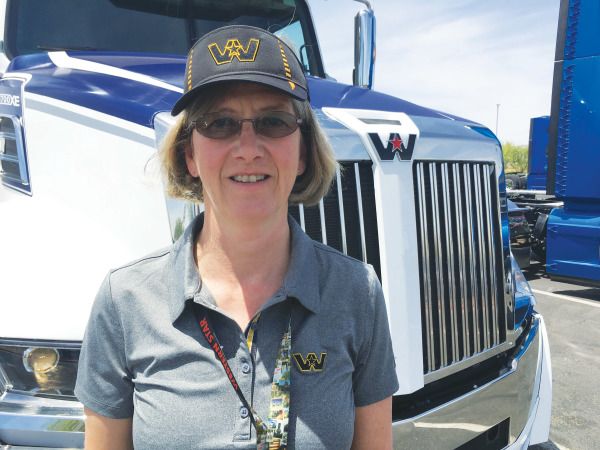In conversation with Kelley Platt, Western Star president
PHOENIX, Ari. — In addition to overseeing the Western Star truck brand, Kelley Platt also serves as chief diversity officer for parent company Daimler Trucks North America (DTNA). It’s a role she clearly relishes and finds gratifying, and she spoke of the benefits of improving diversity during a one-on-one interview with Truck News Apr. 27.

“We want everybody to feel comfortable bringing their authentic self to work every day,” she explained.
DTNA’s efforts to become more diverse included changing where it has traditionally recruited talent from, so it can appeal to a more diverse base. It works with organizations that represent female and African American engineers to attract a broader demographic. Platt is confident the efforts are paying off.
“We are definitely seeing tangible benefits,” she said. “Not only do we have a more diverse workforce, the more diverse your workforce is, the more likely you are to get better solutions to problems.”
Platt has been a proponent of networking since even before she took on her current role as head of diversity two years ago. She was involved in setting up a networking group for female managers within DTNA. Daimler calls these employee resource groups (ERGs).
“The first one we did was a women networking group about a decade ago,” Platt recalled. “We discovered there were about a dozen women in management all across DTNA at that point in time and they didn’t even all know each other.”
Additional ERGs have been set up to appeal to various segments of the employee population within DTNA. They include parenting groups, for example, who organize bring your kids to work activities.
In addition to concentrating on improving DTNA’s diversity, Platt is also focused on growing the Western Star brand’s success within the organization. She has a plan to grow market share from about 3.4% to more than 8% by 2025. With the recent additions of the 5700XE and 4700, Western Star now boasts the broadest product portfolio in its history. Platt said she sees an opportunity for the brand to grow both its vocational and on-highway market share. To do so, the dealer network must be expanded, Platt said.
“There are still parts of the country we don’t play in at all because we don’t have a distribution network there,” she admitted. “We’ll fix that problem. We will play in all markets in the US and Canada.”
But while there are many interested dealers looking to represent the brand, Platt said the company won’t accept just anyone. It wants dealers that truly understand the needs of vocational truck buyers. After all, vocational truck operators are a different breed. They operate their trucks for longer periods of time than on-highway users and usually don’t have spare trucks parked against the fence, so uptime is critical. Nor can they call up Penske or Ryder and order a replacement truck when one breaks down, as they are usually highly specialized vehicles.
“We look for somebody who builds relationships with their customers,” Platt said of the ideal Western Star dealer. “Somebody who knows their customers, knows the kinds of concerns they have, knows their operating cycles, knows how to support those trucks in the long-term, and how to fix them at the customer’s location or to get them in and out of the shop quickly, because time is serious money to these guys.”
Western Star dealers must also be able to help customers spec’ the right trucks in the first place and work with body builders to get the trucks ready to roll without delay.
“It’s much more complicated (than on-highway) and it’s a long-term relationship,” Platt said.
Since vocational truck buyers operate their trucks for longer life-cycles than on-highway fleets, Platt said the dealer-customer relationship is vital and must be fostered. Platt doesn’t feel Western Star has any glaring holes in its product line.
“We are pretty happy with where we are, but we’re always looking to improve what we’ve got and thinking about where we want to be three, five, 10 years down the road,” she said. “So, a lot of time and effort is going into trying to figure out where the industry is going, where customers are going, and what we want to do differently.”
Have your say
This is a moderated forum. Comments will no longer be published unless they are accompanied by a first and last name and a verifiable email address. (Today's Trucking will not publish or share the email address.) Profane language and content deemed to be libelous, racist, or threatening in nature will not be published under any circumstances.